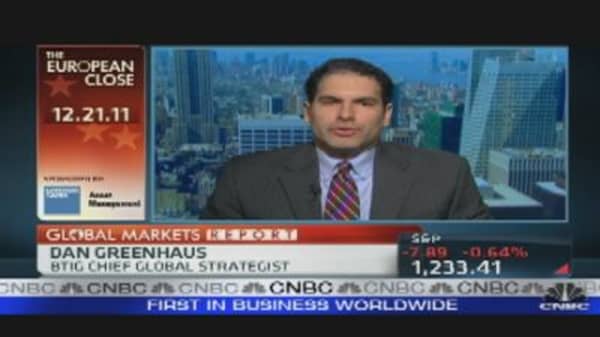Stocks clawed back much of the day's earlier losses, closing mixed to lower as a sharp drop in technology shares outweighed and otherwise positive day for the market.
Technology represented the only negative sector on the Standard & Poor's 500, but that was enough to drag the index to a modestly higher close. Utilities, consumer staples and energy performed best for the index. Big tech names also hurt the Dow industrials, and the Nasdaq lost about 1 percent for the day.
More developments in Europe and weakness in tech earnings dominate the day's market themes.
Oraclewas in the spotlight after it posted earningsthat fell short of Wall Street's forecasts for the first time in a decade after the bell on Tuesday. Oracle's software and hardware sales sputtered, stoking fears a global recession will hurt tech spending. Credit Suisse kept its outperform rating on the company but lowered its price target from $42 to $40 a share.
The company helped make the Nasdaqthe worst of the major indices, with more than double the losses of its counterparts. The PHLX Semiconductor Index fell about 1.2 percent for the day.
On the Dow, General Electric and Coca-Cola led gainers, while a big drop in IBM kept any gains in check for the bluechips.
Elsewhere, the European Central Bank offered 489.2 billion euros ($643.8 billion) in an auction of three-year loans, much higher than estimated, with a total of 523 bidders. The move is part of the ECB's Long-Term Refinancing Operations, or LTRO.
Markets initially reacted sharply positive in hopes the move would help forestall contagion effects from overwhelming debt in the nations known as the PIIGS — Portugal, Italy, Ireland, Greece and Spain.
But it soon became clear there would be plenty more work to be done.
"What we don’t know, and this is why market sentiment is withering so far on Wednesday, is whether or not the record amount of borrowing will end up in the real economy spurring job growth and consumer demand," said Andrew Wilkinson, chief economic strategist at Miller Tabak in New York. "The ECB’s action certainly created a high for the patient, but is no panacea especially for sovereign bonds."
Also in Europe, Franklin Templeton's Mark Mobius, considered a pioneer in emerging market investment, said he expects the sovereign debtcrisis to be resolved by mid-year in 2012.
"The European crisis isn't as deep and terrible as people think," Mobius said, according to a Reuters report. "Nations there are in a process of negotiations and that takes time."




